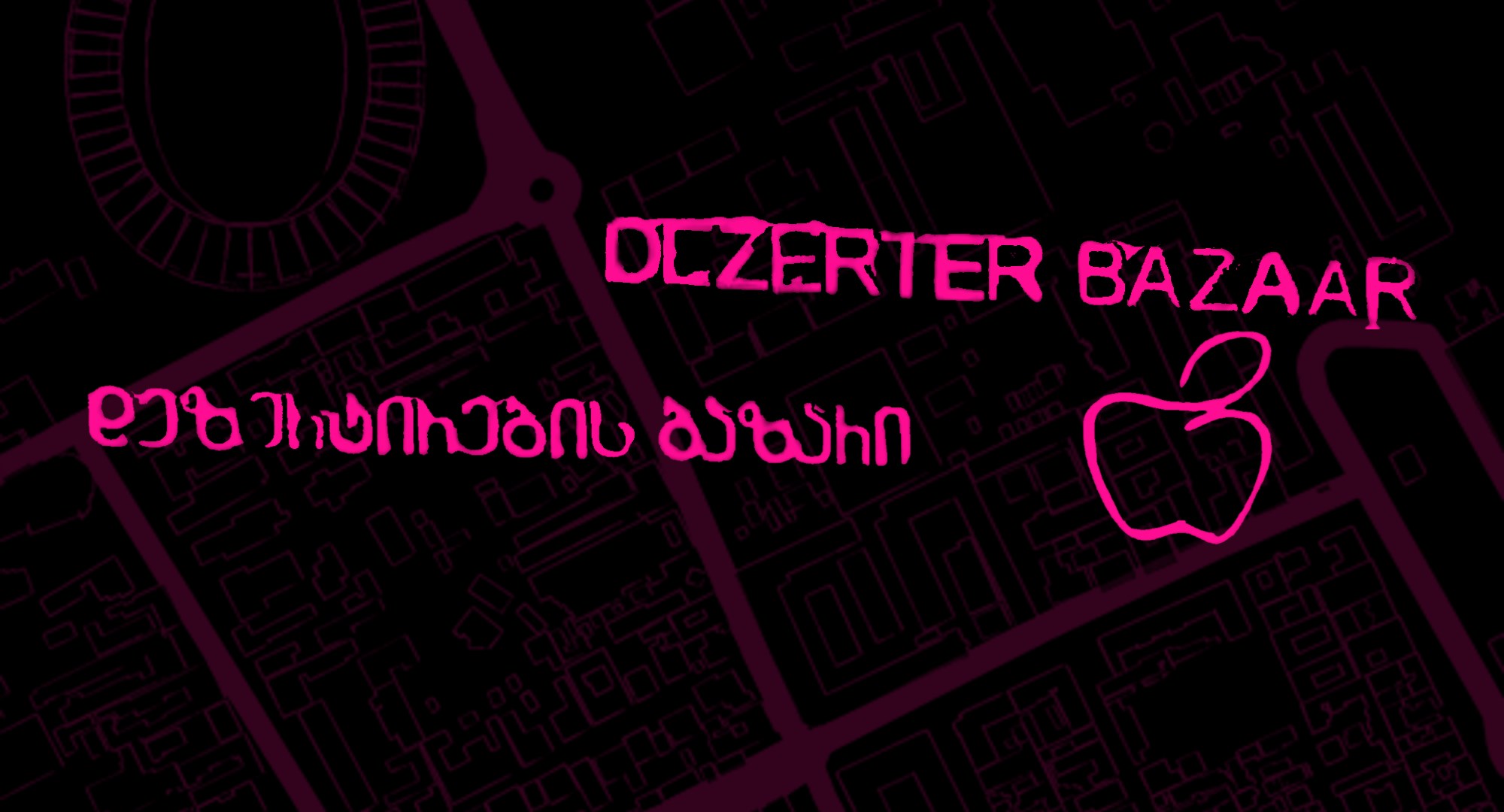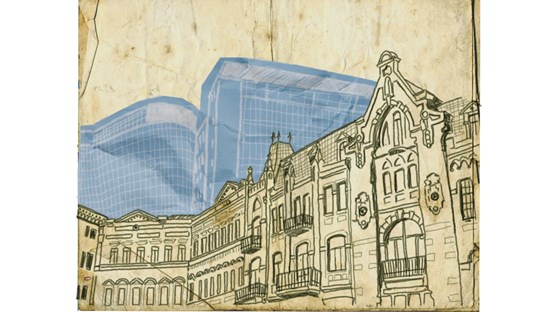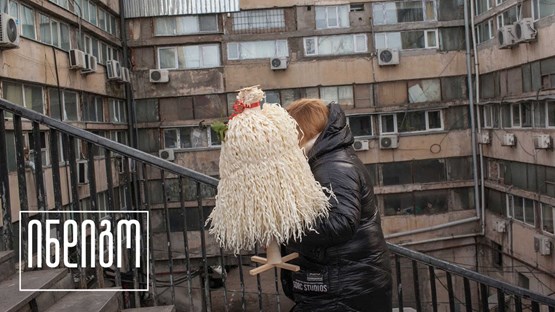
AN ODE TO DEZERTER’S BAZAAR | Paul Rimple
10.07.2024 | 10 Min to readI first stumbled into the Dezerter’s Bazaar with my girlfriend in the summer of 2001 and when we moved to Tbilisi the following year, we had the great fortune of living across the street from Dynamo Stadium. Vagzalis Bazroba, six sprawling city blocks of unhinged free-marketers selling anything you could put a price tag on, was my playground. I knew each pathway in the massive labyrinth of household appliances, second and first-hand cookware and clothes, contraband alcohol and cigarettes, counterfeit Levis and Adidas, Nokia and Motorola cell phones… I bought my daughter a stroller in Children’s World and my wife earrings and a necklace at the jewelry bazaar before it mysteriously burnt down in 2017. The best art supply shop in the city was nestled behind a kitchenware section. I once arrived to a locked door during lunch break only to be invited in and given a full plate and glass of wine. We sat for over an hour drinking toast after toast.
In the middle of this mind-bending daily pandemonium was the central produce market, Dezerter’s Bazaar. Streets and sidewalks disappeared under tables, boxes, blankets and jalopies with open trunks displaying village produce. Shoulder-to-shoulder, people bumped and shuffled and haggled while sweaty men with cigarettes hanging from their lips parted the mass with iron push carts. Occasionally, a diesel-spitting marshrutka or exhaust-sputtering Jiguli would plow through the melee tooting their horns while women sang “tseli khachapuri, cigareti, parkebi” in near perfect polyphony. Armies of cats lazed on the tin roofs in the day and patrolled them at night. In the winter people lit fires from broken pallets and plastic litter, the noxious smell filled the air.
“You know bro, the only people who used to come here at night in the 90s were crazy guys with Kalashnikovs,” Zaza Korinteli told me one evening on a little shopping trip for wine. We had met in Krakow and formed a blues band before he and his cousin moved in with us. Now we were living together again and he was enjoying fame from his hit, Vashlis Gamyidvelo, a song about buying the most beautiful apple at the bazaar only to discover it was rotten inside. His popularity and warm nature made for substantial discounts from all the vendors, except the apple guys who often confronted him saying, “Hey, why did you write that song about me?”
I often came just to trip out over a glass of chacha or wine from a stall upstairs in the old Soviet tin-roofed building; the epicenter of it all. The waft of fish from outside would mingle with odors of stacked wheels of guda, pyramids of chickens and plastic buckets of spices while axe whacks from the butchers would echo through the din of the crowd.
“You go there for fun? What, are you crazy?” my Georgian friends would cry. “We only go there when we absolutely have to!”
After a year we moved across the river to Vera and my forays into the bazaar became much less frequent. I remember one day showing up to find the entire main bazaar building gone.
The city had knocked it down and displaced all the traders. Then, across the street a little mall was built for Chinese businesses selling cheap plastic goods which seemed to have appeared overnight (and would later disappear just as suddenly). Vendors were kicked off the sidewalks and put into a handful of new kiosks. It was now possible to drive down both lanes of Tsinamdzghvrishvili Street (although I still couldn’t pronounce it). The Dezerter’s Bazaar was becoming gentrified. By then pickpockets were less of a concern, money exchangers could be slightly more trusted to count money. It may have been more civilized, but the bazaar still had its edge, its rawness, its wholesomeness.
When Goodwill and Carrefour arrived to Tbilisi, I became a slave to convenience like everyone else. The only time I visited Dezerter’s was when I had to, like for Christmas as it was the only place I could find a turkey. However, whenever guests from abroad came to visit, I’d take them to Dezerter’s before going to the National Gallery, Abanotubani or Mtskheta because in my world culture begins with food, and food culture everywhere in the world begins at the farmer’s market.
I started my professional life as a cook, working my way up from dishwasher to saucier. I gave up the kitchen to pursue music and later journalism, which I have spent my life in Georgia doing as a freelancer. In 2016, as I was getting burnt out on straight journalism, an international culinary tour company contacted me and asked if I would write about Georgia’s burgeoning food and wine scene. Then the two co-founders came to visit and naturally, I took them to the Dezerter’s Bazaar. This eventually became part of my job. My Georgian friends who had thought I was crazy to love the bazaar found it more incredulous that I actually got paid to take people there. But financial compensation was just a perk. The real reward was reconnecting to the Tbilisi I had fallen in love with and absent-mindedly abandoned.
While I was mapping out my walk, some sort of cosmic force lead me deep into what had been the Chinese shopping mall, past the chicken vendors (thank god they have refrigerators now), the fishmongers (how many times has that fish been frozen?), past the bald barber cutting hair in a closet, the honey guy, Gurian tea lady (she has a big bag of tobacco under the counter) and into a nook where Nunu Gachechiladze and her stoic husband Tamaz sold their fermented vegetables.
Nunu, smiling broadly with painted red lips, seemed to be waiting for us. She didn’t say “hello,” she said “try,” and offered my wife and I a perfect pickled cucumber. My wife is Polish and by default a cucumber snob. She replied, “one kilo.”
Nunu became my pickle queen and this nook became the climax of my walk and included the remarkable adjika paste from Miss Vardo at the next stand and the aromatic Kakhetian oil from Guilia Kirkitadze at the next. Nunu’s carrots won over Tekuna Gachechiladze (no relation) who used them at her restaurant, Khasheria.
During one tour, I lost two German guests while walking through the new ugly, soulless bazaar building that Saakashvili eventually built to replace the classic one he had destroyed. I found them chatting with a round-cheeked little woman in German named Tina. She had a stand much like another half dozen along the perimeter selling spices, tkemali, churchkhela, jams and dried fruits, but Tina made her sauces on site. She was also adorable. She was a cardiologist and health ministry administrator who was forced to retire early when the Saakashvili administration purged all the old school officials from the ministries. Tina’s stand became the first main stop on the walk for a sampling of her sauces and our first chacha ambush.
Many of the vendors displaced from the demolition of the Soviet building relocated to the second floor of an old brick building nearby called Dinamo Market. I like to bring guests here because it hints of the old days. I once witnessed a massive butcher brawl with six terrified guests, otherwise the energy level is subdued. Ilia and Soso are two honey vendors who have competed side by side for years. Whenever Ilia is napping with his head on the table, Soso likes to remind me that I should never buy honey from him because “he’s asshole.” For guda, I introduce guests to Nana, the only person in the building with authentic guda aged in the skin. For sulguni, we meet Mahkvala whose cheese is always fresh like her smile and my nadugi guy, Gia, shares the counter with her and happens to live a block away from me, although we have yet to bump into each other in Vera.
Aleko became my nut guy after my previous nut lady told me all her technicolored fruit candies from Central Asia and pistachios were Georgian. “Are these Georgian?” I asked him, squeezing a piece of walnut to check its oil. “No Ukrainian. We had a bad year. But these are Georgian. Five lari more,” he replied. A wise man once said “Honesty pays dividends in dollars,” and he was right. While sampling his selections, I can typically expect an encounter from Aliev, the halal butcher who for some reason always calls me Jimi, and is only halal when it comes to meat. “Modi, modi, Jimi,” he says, flicking his neck.
Back downstairs there is Luiza, my blue-eyed spice girl who came from Sukhumi in 1993 like so many sellers here. And Raul, a fishmonger I will never buy fish from because I don’t trust Black Sea fish displayed in the sun, but his smile is real and his laugh is borderline hysterical. This alley used to be full of wine vendors, where I first came with Korenteli and gulped glasses of wine from a plastic barrel. I returned alone for my first time, knocked back a glass of wine, bought three liters and brought it back to Zaza’s, who had a couple friends over.
“Hey guys, check it out, I got some great wine,” I said. We filled glasses, clinked them and took the wine down. “Pretty good?” I smiled knowingly.
“Paul,” a friend said holding my shoulder. “If this wine is so good, why is there water in it?”
These wine dealers are all gone now. For a while there were five or six tables in the back alley, not far from a guy selling live turkeys. This was where the men of the bazaar came for liquid lunches of chacha and sour, watered-down wine. My fellow Georgian guides were too ashamed to bring guests here for a drink, but I like to show how far our wine culture has come (we finish the tour at a wine bar with a proper degustation of natural wines) and to catch a feature of the bazaar landscape that is disappearing. This is living history, these dives were everywhere, many in storefronts and tucked into basements on the bazaar’s side streets. Today only two counters are left, moved in an alley below Tsinamdzghvrishvili.
What started as a reconnection to Tbilisi eight years ago has become part of my life. Nunu my pickle queen died of a heart attack in 2018. I will never forget the image of her husband Tamaz standing alone behind their display, eyes watering when I gave him my condolences. They worked together seven days a week. Making pickles and selling them here wasn’t a job, it was their life, and by introducing them to my guests over the years I had become part of it, too. For that, I am eternally grateful.
Recently, I asked Guilia, who shares the nook with Tamaz and Vardo, about the rumors that developers plan to demolish Dezerter’s Bazaar and build a shopping mall in its place. She pulled out a stack of 20 year-old documents from under a bucket of Svaneti salt. Guilia, an IDP from Abkhahzia, had been among the original vendors from the original bazaar and had been an organizer of the protest to save the building from Saakashvili’s demolition. Among these documents was her petition with hundreds of signatures.
“We did everything, protested, had a human chain around the building. I had to go to the village one day and I got the call that they destroyed the building in the middle of the night. I lost everything. Everyone who worked there lost everything,” Guilia said, tears filling her eyes.
The proposed mall will displace well over a hundred vendors from the territory of the new building, including the semi-trucks with Turkish off-seasonal produce. Tina says the developers offered everyone spaces in a proposed bazaar near Isani, which is like offering a cancer patient aspirin treatment. Everyone depends on their regular clientele of restauranteurs, shopkeepers and tourists. Who will follow a vendor across the city when they can walk across the street and buy from someone else? Traders in the rest of the bazaar - the old building, the former Chinese mall, and outlying alleys - say they will not be affected.
“They won’t do it,” Tina asserts. “They make too much monthly rent from us.”
I wished I was as certain as she. People also say the geology of the site - above the metro line - means it will not hold any structure heavier than the existing building, which I’d also like to believe, but if construction practices of the past decades have taught us anything it’s that Tbilisi will build whatever it wants wherever it wants without any urban planning consideration whatsoever.
As tragic as losing the building would be, we will still be able to find all the foods and produce we need at wholesale prices there on Tsinamdzghvrishvili. The Dezerter’s Bazzar is not a building, it is a historical landmark, an institution that has survived the Russian Empire, communism, civil wars, Misha Saakashvili and COVID-19. It will survive Bidzina too. In the meantime, I’ll continue to introduce guests to my special world and revel in a sensory overload of flavors, sounds, smells, sights and feelings. I’ll keep shopping from my favorite traders and friends, and making new discoveries. Last month I met a woman selling avocados for the best price in the city.
We Recommend






